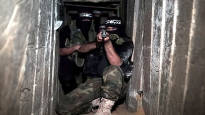The violence between Israel and Hamas that flared up over the weekend has shifted the entire world’s attention to the Middle East.
The other side of the dispute, Hamas, the Islamist extremist organization that controls the Gaza Strip, made an exceptionally devastating attack on Israel over the weekend.
But what exactly is Hamas?
asked a senior researcher at the Foreign Policy Institute about it From Timo R.Stewart.
Hamas is a Palestinian political party and Islamist organization founded in 1987. Why is it called a terrorist organization in the news?
– Hamas is referred to as a terrorist organization because it uses violence against civilians to achieve its goals. Hamas does not recognize Israel and is trying to take control of the entire historical Palestinian territory, i.e. both the territories occupied by Israel and the territories belonging to the State of Israel.
Israeli Prime Minister Benjamin Netanyahu compared The weekend attack by Hamas to the attacks by the terrorist organization Isis. Why?
– The purpose of the comparison was probably to show how brutal violence Hamas used in the weekend attack. Netanyahu also perhaps wanted to signal that Hamas, like ISIS, has no legitimacy. So Israel sees Hamas as a thoroughly evil movement with which it cannot negotiate.
So does Hamas have anything in common with ISIS?
– ISIS and Hamas are united by the fact that both use terrorism as a means of influence. Both are also motivated by Islamism, i.e. the views of political Islam. That’s where the similarities end. Hamas is more moderate than Isis in implementing Islam. Hamas seeks living space for Palestinians in the Palestinian territory. It does not aim for a cross-border caliphate like Isis.
What is the status of Hamas in the international community?
– Hamas has no position in the international community because of its terrorism status.
– Israel and the West do not recognize Hamas and do not support it with development aid. However, it is a kind of spectacle when governments say they will not negotiate with Hamas. Hamas has been responsible for the residents of Gaza for years and many things are coordinated through Hamas. For example, the UN coordinates its activities with Hamas and the West delivers humanitarian aid to the Palestinian territories, although it does not negotiate with Hamas. Some countries like Iran openly support Hamas.
What kind of violence has Hamas done to civilians in the past?
– Over the years, Hamas has become public due to suicide bombings, civilian kidnappings and rocket attacks. Since 2007, when Israel began the blockade of Gaza, Hamas’s ability to attack Israel has become more difficult. Besieged Hamas first started firing mortars and home-made rockets into Israel. Over the years, the Palestinians’ ability to build rockets and fire them at Israeli cities has improved. Hamas seems to be carrying out attacks on the civilian population on purpose. The attacks have been investigated as war crimes.
Hamas has held power in the disputed Gaza Strip since 2007. What kind of social order is there?
– Hamas does not organize elections. It breaks up demonstrations, persecutes the political opposition and does not promote an open society. The social order is authoritarian and based on Sharia law. The majority of Palestinians are Sunni Muslims, but the Palestinian territories are not the most conservative societies in the Middle East. To some extent, Hamas therefore has to adapt to what the population is ready to accept.
Hamas’s political opponent is Fatah, the ruling party of the Palestinian Authority in the West Bank. What is the dispute between the moderate Fatah and the extremist Hamas about?
– The dispute between Fatah and Hamas is about power. Fatah is based on secular nationalism with leftist overtones. Hamas, on the other hand, has basically had more views based on political Islam. Hamas emerged as a protest movement. In 2006, Hamas won the elections and formed a government. Hamas succeeded in part because Fatah made deals with Israel that did not please the Palestinians. Fatah was ready to accept a two-state solution, a Palestinian state based in the West Bank, Gaza and East Jerusalem.
What kind of support does Hamas have in the Palestinian territories?
– It is difficult to measure the actual support of Hamas, because Gaza and the West Bank are not politically free. In the previous elections in 2006, Hamas’ support was around 44 percent. Galluppie according to Hamas’ rule, people have not been satisfied with the way things are handled in Gaza.
Has Hamas tried to reach an agreement with Israel through peaceful means?
– Peace negotiations between the Palestinian territories and Israel have repeatedly failed. Hamas has not participated in them. The most significant progress was made 30 years ago. At that time Israel and the Palestine Liberation Organization PLO recognized each other. We agreed on the Palestinian Authority in Gaza and the West Bank. The idea was to negotiate the borders and the status of Jerusalem after a five-year transition period. In the last ten years, the borders have not been negotiated. Gaza is still blockaded and everyday life in the West Bank is still running on the basis of mechanisms meant to be temporary. Of course, this does not increase well-being in the area.
How has years of life in uncertain conditions been reflected in the daily lives of Palestinians and affected them?
– Both Hamas and Israel commit violence against Palestinians in the occupied territories. Israel allows Jews to build settlements in the territories it occupies in the West Bank. The years-long blockade of Gaza has made living conditions miserable.
– The children of the 90s may have grown up in peace and had hope for a better future, but those born in the 21st century have seen bloody events one after the other and have grown up living without hope for a better future. Some of the Palestinians are radicalized and support armed resistance.
